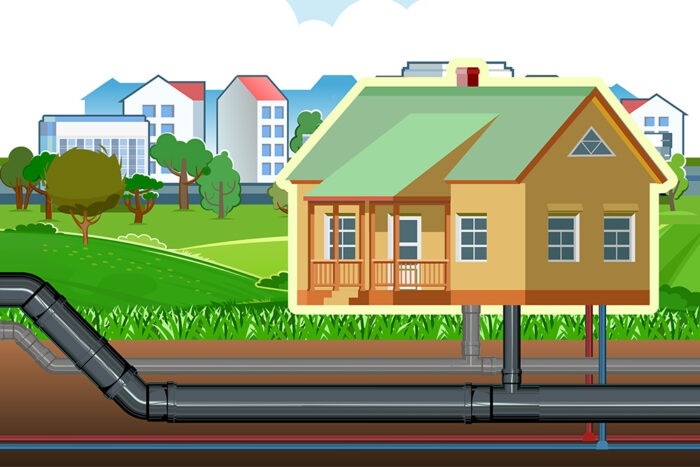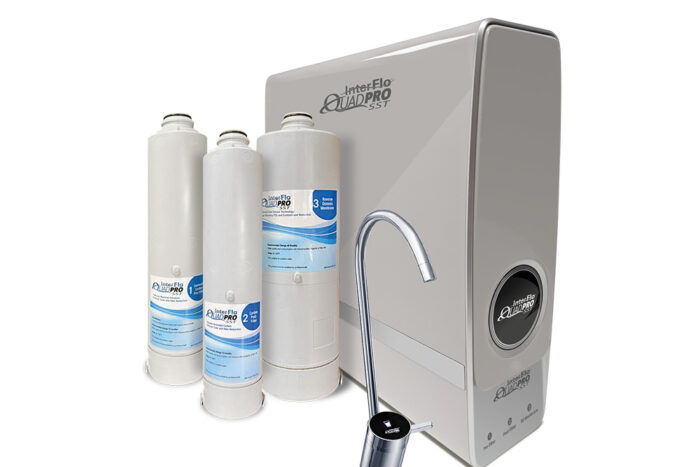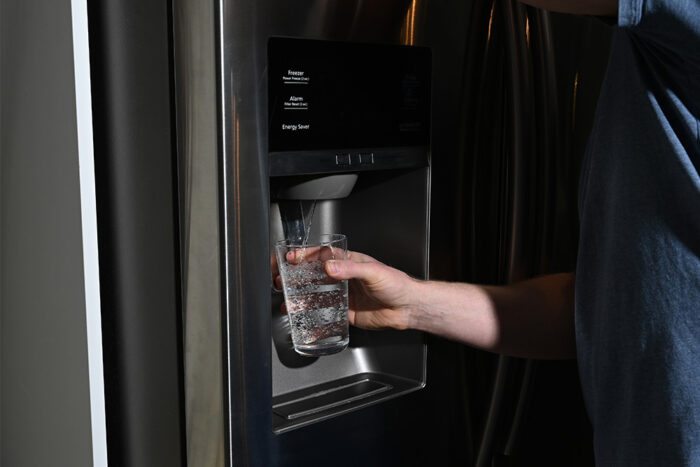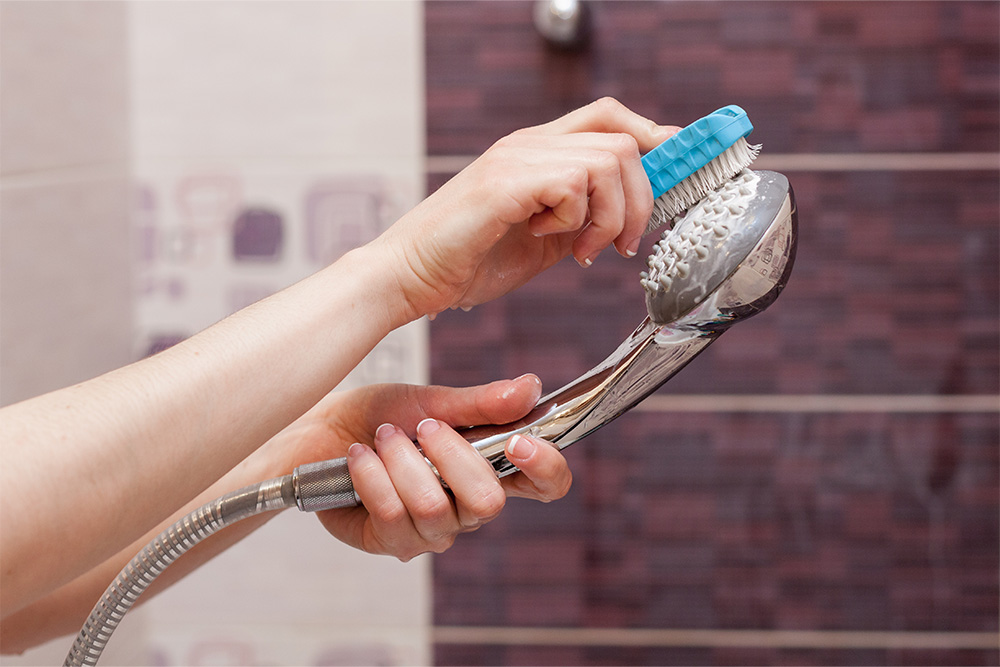We all realize that keeping your home looking fresh and clean takes a lot of hard work. Unfortunately, hard water makes that job much more difficult.
Whether its soap scum in your shower, streaks on your mirror, crusty white residue on your fixtures, or stains in your toilet, getting rid of those unsightly spots is a major chore. If you’re looking for DIY home cleaning advice, we’ve got some for you.
But … if you’re looking for a way to check the task of scrubbing away hard water stains off your list once and for all, we’ll explain what you need to do.
What Causes Hard Water Spots?
Calcium and magnesium are what cause water to become “hard.” These minerals are dissolved in your home’s water from rocks beneath the earth’s surface. When the water evaporates, it leaves mineral deposits behind.
Some people assume that only homes with private wells have hard water problems. The truth is, at least 85 percent of U.S. households have water that’s considered hard. That includes many people with city water, because municipal water treatment does not address hardness.
Hard water is the reason for clogged shower heads and dirty faucets covered in chalky white residue. Calcium and magnesium also create soap scum in your shower or bathtub. When these dissolved minerals combine with soap, they form a bound that creates the thick residue.
According to home living blog The Spruce, if soap scum is left uncleaned for too long, it can lead to mold and mildew. Soap scum on vinyl shower curtains can leave behind a microbial film that harbors nasty bacteria. At this point, you’re probably in the mood to grab some rubber gloves and start cleaning.
Hard Water Spot and Stain Removal Hacks
There are certain cleaning products formulated to help remove soap scum and hard water spots. These products essentially soften your water for you as you clean. Yet, many homeowners prefer not to use harsh chemicals if possible. Here are a few DIY tips for folks who’d rather use typical household products to attack soap scum. The common ingredients include: white vinegar, baking soda, lemon juice, and Borax.
1. Clean Soap Scum with a Spray Bottle
To get rid of widespread soap scum in your shower, try mixing together half white distilled vinegar and half water in a spray bottle. Let the solution sit for a few minutes before wiping down the shower. The acidity of the vinegar helps to combat the alkaline minerals in the hard water deposits. You may want to use a squeegee on glass shower doors and mirrors.
2. Stained Fixtures
If the area around your sinks or other fixtures contains a lot of chalky residue, soak some paper towels in white vinegar and wrap them around the base of the fixture. Leave the wet towels in place for about an hour. Then, rinse it with water and wipe away the remaining scum.
3. Toilet Hard Water Stains
For toilets with ugly hard water spots, try pouring a mixture of either vinegar and baking soda, or vinegar and Borax in the bowl. As you may already know, these combinations will create a fizzy chemical reaction that could help you clean away stains with your toilet brush.
Use about a cup of baking soda with one cup of white vinegar. Of if you use Borax, mix a quarter cup to one cup of vinegar.
4. Make a Stain-Fighting Paste
For particularly stubborn stains, such as those found on grout and ceramic tile, you can use Borax or baking soda with white vinegar to create a paste. In this case, you’d use less vinegar and more of the powdered ingredient to form a thicker substance, which you can spread on problem areas.
After applying the paste to the stain, wait about 15 minutes before scrubbing it away.
5. Clogged Showerheads
If your shower seems to be gradually losing water pressure, it may be that the showerhead has become calcified with mineral deposits from hard water. To solve this problem, remove the showerhead and let it soak in a container of white vinegar for a few hours before scrubbing it with a brush.
Don’t want to take off the showerhead? Another technique some homeowners use is mixing vinegar and baking soda in a plastic bag and placing the solution over the showerhead with a rubber band to let it soak.
6. Lemon Juice Solution
If you go to your pantry and realize you’ve used all your white vinegar for other household cleaning hacks, you could also try using lemon juice. The cleaning experts at Maid Brigade say spraying lemon juice on faucets and fixtures with hard water stains is an effective alternative to chemical cleaners.
Want a Permanent Solution? Get a Water Softener!
The problem with all the cleaning hacks we’ve listed above is that you’ll have to keep doing them over and over again. Soap scum and hard water stains will keep coming back until you address the real problem … the quality of your home’s water.
When you have a water softener installed in your home, it will remove the calcium and magnesium. Soft water won’t leave the same residue all over your home. Plus, soft water is ideal for cleaning, which means it will make housework a lot easier.
In fact, yet another issue with having hard water is you tend to use excessive amounts of cleaning product to counteract the effects of those minerals. In-depth studies have found a water softener can help you save hundreds of dollars on cleaning products every year.
What You Can’t See Could Cause Even More Damage
For most modern homes, a high-quality water softener is not a luxury, it’s a necessity.
If you notice a lot of soap scum and hard water stains around your home, there’s a good chance hard minerals are causing bigger problems than housecleaning headaches.
Mineral deposits can clog up your plumbing in much the same way cholesterol buildup clogs arteries. Hard water causes certain appliances like washing machines and water heaters to become inefficient and wear out sooner than expected. Because hard water doesn’t work well with most soaps and detergents, residue also gets left behind on your laundry, causing fading and deterioration of fabrics.
Worst of all, that same soap scum in your shower is left behind on your hair and skin. It can cause dryness, irritation, and a not-so-lovely look that’s known as “hard water hair.”
The good news is, a water softener can solve all these problems for you. If the issues we’ve mentioned in this article sound familiar to you, consider contacting a local Water-Right expert for a free evaluation of your home’s water quality.
Find the right contractor for you.
Recent Homeowner Resources

Are You Drinking Contaminated Water? New Rules Help Homeowners Identify Lead Risks

Introducing InterFlo® QuadPro SST!



